The first feature-length film in the Hirschfield International Film Series, the Chinese atmospheric thriller “Only the River Flows,” which premiered in the Official Selection of the Cannes Film Festival, was greeted warmly by a packed Dana Auditorium on Oct. 17.
Assistant Professor of Chinese Chialan Sharon Wang opened the event with an introduction to the background of the film. Based on esteemed Chinese novelist Yu Hua’s short story “Mistakes by the River,” the film takes place in a riverside town in rural China in the 1990s, where a series of murders unfold. The audiences follow principal character Ma Zhe (Zhu Yilong) as he attempts to uncover the truth behind the crimes.
The film, a neo-noir piece characterized by its shadowy cinematography, ambiguous morality and underlying theme of paranoia, was almost entirely shot on 16 mm film. The relatively dim, blurry, and blue-tinted image it captures recreated the atmosphere of the 1990s. “Only the River Knows,” the name of the film in English, directly implies that the truth behind the murders would flow with the river, drowning in the tides of time never to be uncovered.
At the beginning of the film, under the melancholy, ominous tunes of Beethoven’s “Moonlight Sonata,” Grandma Four, a widow who adopted a madman, is found dead by the river. Ma Zhe, the criminal police captain, is tasked with solving this peculiar murder. The trails lead him to unexpectedly uncover the secret romantic relationship between Wang Hong (Moxi Zishi) and Qian Lin (Baisha Liu). However, just as he seems to be closing in on the murderer, the truth slips through his fingers as his suspect, Hong, also dies by the river shortly afterward with “Moonlight Sonata” playing once more.
Ma then encounters the madman, now wearing bloodstained clothes, and captures him, sending him to an asylum. Later, his investigation reveals that one of the witnesses, Xu Liang, has a hidden life, dressing as a woman, which leads to Xu’s suicide. The singular murder of Grandma Four escalates into a series of deaths: Wang Hong, Xu Liang and, in the end, a child.
Through his relentless pursuit of the truth, Ma seems to be inadvertently pushing the suspects and witnesses to death as he spills out unintended information, ruining their lives with his constant refusal to believe the madman is the true culprit behind the murders.
Tormented by the case, his wife’s pregnancy and attendant fears of having a deficient child, Ma Zhe’s mental state continues to deteriorate as the film puts its neo-noir quality on full display with reality becoming harder to distinguish from illusion. In one scene, Ma appears to shoot the madman in a temple, but the next day, it is revealed that he fired no shots — it was entirely a hallucination. Finally, Ma Zhe, disillusioned, plunges into the river. He encounters the madman onshore and, in a moment of madness, beats him to death with a rock. The film closes with Ma Zhe receiving his long-sought-after merit award and a final scene of him and his wife bathing their newborn child in an angelic light.
Despite not explicitly solving the mystery of the murder within the film, the movie was thoroughly enjoyable. Many audience members lingered to discuss the plot, piecing the narrative together with Assistant Professor of Film & Media Culture Nikolina Dobreva. Points were raised on how the movie’s purposeful erasure of the true narrative behind the murder and the frequent impasses of Ma Zhe’s quest was symbolic of the journey of life with our constant fixation on truth. Another interesting motif is that of the madman; every character killed in the movie was either a marginalized or deviant figure in society. Even Ma Zhe’s baby, playing with his striped towel, resembles the madman in his mannerisms. This pattern suggests that the oppressive, Kafkaesque, bureaucratic system depicted in the film ultimately drives everyone into madness and eventually death.
“Only The River Flows” is a memorable piece. In the end, it was not only the river that flowed – our thoughts also flowed with the film’s currents as we followed Ma Zhe through the film, reflecting on unresolved answers and elusive truths.




